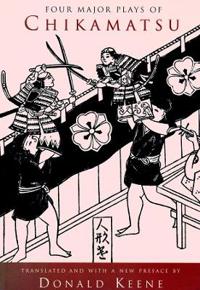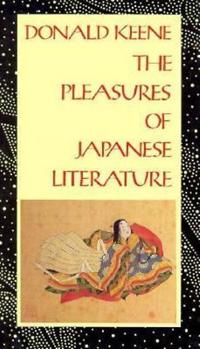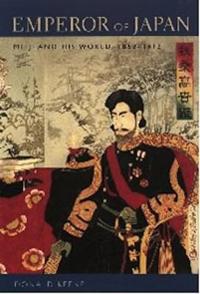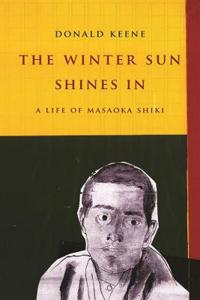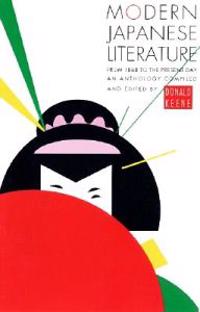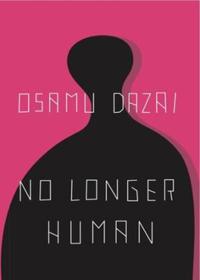Four Major Plays of Chikamatsu (Pocket)
avMonzaemon Chikamatsu, Donald (TRN) Keene, Donald Keene
ISBN: 9780231111010 - UTGIVEN: 1997-09Chikamatsu Monzaemon (1653-1725) wrote some 130 plays, chiefly for the puppet theater, many of which are still performed today by puppet operators and Kabuki actors. Chikamatsu is thought to have written the first major tragedies about the common man. This edition of four of his most important plays[...]
The Pleasures of Japanese Literature (Pocket)
avDonald Keene
ISBN: 9780231067379 - UTGIVEN: 1993-03Introduces Japanese culture, and discusses the aesthetics, poetry, fiction, and theater of Japan
No and Bunraku: Two Forms of Japanese Theatre (Övrig)
avDonald Keene
ISBN: 9780231074193 - UTGIVEN: 1990-12-19Donald Keene combines informative works on two forms of classical Japanese theater into a single volume. The No text looks at all aspects of this traditional theater form including its history, its stage and props, the use of music and dance in its performances, the plays as literature, and the aest[...]
Sources of Japanese Tradition: v.1 (Pocket)
avWilliam Theodore De Bary, Donald Keene
ISBN: 9780231086042 - UTGIVEN: 1964-03-01Dawn to the West: Japanese Literature in the Modern Era: v. 1: Fiction (Pocket)
avDonald Keene
ISBN: 9780231114356 - UTGIVEN: 1998-12-21Travelers of a Hundred Ages: The Japanese as Revealed Through 1,000 Years of Diaries (Pocket)
avDonald Keene
ISBN: 9780231114370 - UTGIVEN: 1999-04-21In Japan, the diary has acquired the status of a literary genre comparable in importance to the novel and the literary essay. Donald Keene, hailed in the "New York Times Book Review" as "the century's leading expert on Japanese literature," presents a collection of pre-modern Japanese diaries that i[...]
Dawn to the West: Japanese Literature of the Modern Era: v.4: Poetry, Drama, Criticism (Övrig)
avDonald Keene
ISBN: 9780231114394 - UTGIVEN: 1999-04-06-- Los Angeles Times
Seeds in the Heart: Japanese Literature from Earliest Times to the Late Sixteenth Century (Övrig)
avDonald Keene
ISBN: 9780231114417 - UTGIVEN: 1999-09-15Donald Keene employs his prodigious wealth of knowledge, critical insight, and narrative aplomb to guide readers through the first nine hundred years of Japanese literature -- a period that not only defined the unique properties of Japanese prosody and prose but also produced some of its greatest wo[...]
Modern Japanese Diaries: The Japanese at Home and Abroad as Revealed Through Their Diaries (Pocket)
avDonald Keene
ISBN: 9780231114431 - UTGIVEN: 1999-02-28This is a collection of journals written by Japanese men and women--from samurai and other government officials to novelists and poets--who journeyed to America, Europe, and China between 1860 and 1920. The diaries faithfully record personal views of the countries and their cultures and sentiments t[...]
World within Walls: Japanese Literature of the Pre-Modern Era, 1600-1867 (Övrig)
avDonald Keene
ISBN: 9780231114677 - UTGIVEN: 1999-09-29The Tokugawa family held the shogunate from 1603 to 1867, ruling Japan and keeping the island nation isolated from the rest of the world for more than 250 years. Donald Keene looks within the "walls" of isolation and meticulously chronicles the period's vast literary output, providing both lay reade[...]
Emperor of Japan: Meiji and His World, 1852-1912 (Inbunden)
avDonald Keene
ISBN: 9780231123402 - UTGIVEN: 2002-03-20Emperor of Japan (Häftad)
avDonald Keene
ISBN: 9780231123419 - UTGIVEN: 2005-03When Emperor Meiji began his rule, in 1867, Japan was a splintered empire, dominated by the shogun and the daimyos, who ruled over the country's more than 250 decentralized domains and who were, in the main, cut off from the outside world, staunchly antiforeign, and committed to the traditions of th[...]
Five Modern Japanese Novelists (Övrig)
avDonald Keene
ISBN: 9780231126113 - UTGIVEN: 2005-06-01The New Yorker has called Donald Keene "America's preeminent scholar of Japanese literature." Now he presents a new book that serves as both a superb introduction to modern Japanese fiction and a memoir of his own lifelong love affair with Japanese literature and culture. Five Modern Japanese Novel[...]
Sources of Japanese Tradition: v. 2: 1600 to 2000 (Övrig)
avWilliam Theodore De Bary, Carol Gluck, Arthur Tiedemann, Donald Keene
ISBN: 9780231129848 - UTGIVEN: 2003-10-29Since it was first published more than forty years ago, Sources of Japanese Tradition, Volume 2, has been considered the authoritative sourcebook for readers and scholars interested in Japan from the eighteenth century to the post-World War II period. Now greatly expanded to include the entire twen[...]
Yoshimasa and the Silver Pavilion: The Creation of the Soul of Japan (Inbunden)
avDonald Keene
ISBN: 9780231130561 - UTGIVEN: 2003-10-15Yoshimasa and the Silver Pavilion: The Creation of the Soul of Japan (Övrig)
avDonald Keene
ISBN: 9780231130578 - UTGIVEN: 2005-12-16Yoshimasa may have been the worst shogun ever to rule Japan. He was a failure as a soldier, incompetent at dealing with state business, and dominated by his wife. But his influence on the cultural life of Japan was unparalleled. According to Donald Keene, Yoshimasa was the only shogun to leave a las[...]
Frog in the Well: Portraits of Japan by Watanabe Kazan, 1793-1841 (Övrig)
avDonald Keene
ISBN: 9780231138260 - UTGIVEN: 2006-04-28Frog in the Well is a vivid and revealing account of Watanabe Kazan, one of the most important intellectuals of the late Tokugawa period. From his impoverished upbringing to his tragic suicide in exile, Kazan's life and work reflected a turbulent period in Japan's history. He was a famous artist, a [...]
Chronicles of My Life: An American in the Heart of Japan (Övrig)
avDonald Keene
ISBN: 9780231144414 - UTGIVEN: 2009-09-02"I sometimes think that if, as the result of an accident, I were to lose my knowledge of Japanese, there would not be much left for me. Japanese, which at first had no connection with my ancestors, my literary tastes, or my awareness of myself as a person, has become the central element of my life."[...]
So Lovely a Country Will Never Perish: Wartime Diaries of Japanese Writers (Övrig)
avDonald Keene
ISBN: 9780231151467 - UTGIVEN: 2010-04-02The attack on Pearl Harbor, which precipitated the Greater East Asia War and its initial triumphs, aroused pride and a host of other emotions among the Japanese people. Yet the single year in which Japanese forces occupied territory from Alaska to Indonesia was followed by three years of terrible de[...]
The Winter Sun Shines in (Inbunden)
avDonald Keene
ISBN: 9780231164887 - UTGIVEN: 201308Rather than resist the vast social and cultural changes sweeping Japan in the nineteenth century, the poet Masaoka Shiki (1867--1902) instead incorporated new Western influences into his country's native haiku and tanka verse. By reinvigorating these traditional forms, Shiki released them from outda[...]
Frog In The Well -- Portraits Of Japan By Watanabe Kazan, 1793--1841 (Inbunden)
avDonald Keene
ISBN: 9780231210034 - UTGIVEN: 2013-08-27Modern Japanese Literature (Häftad)
avDonald Keene
ISBN: 9780802150950 - UTGIVEN: 1994-01Translated selections from literary writings of the last 80 years reflects strongly the social, political and cultural Japanese background[...]
No Longer Human (Häftad)
avOsamu Dazai, Csamu Dazai, Donald Keene
ISBN: 9780811204811 - UTGIVEN: 197301

